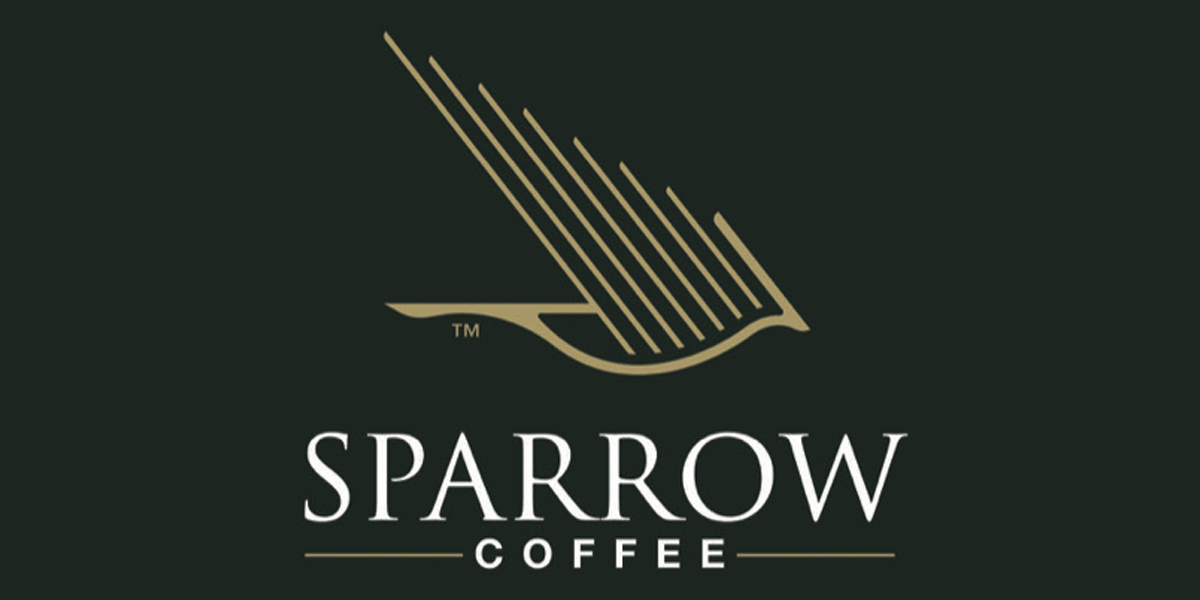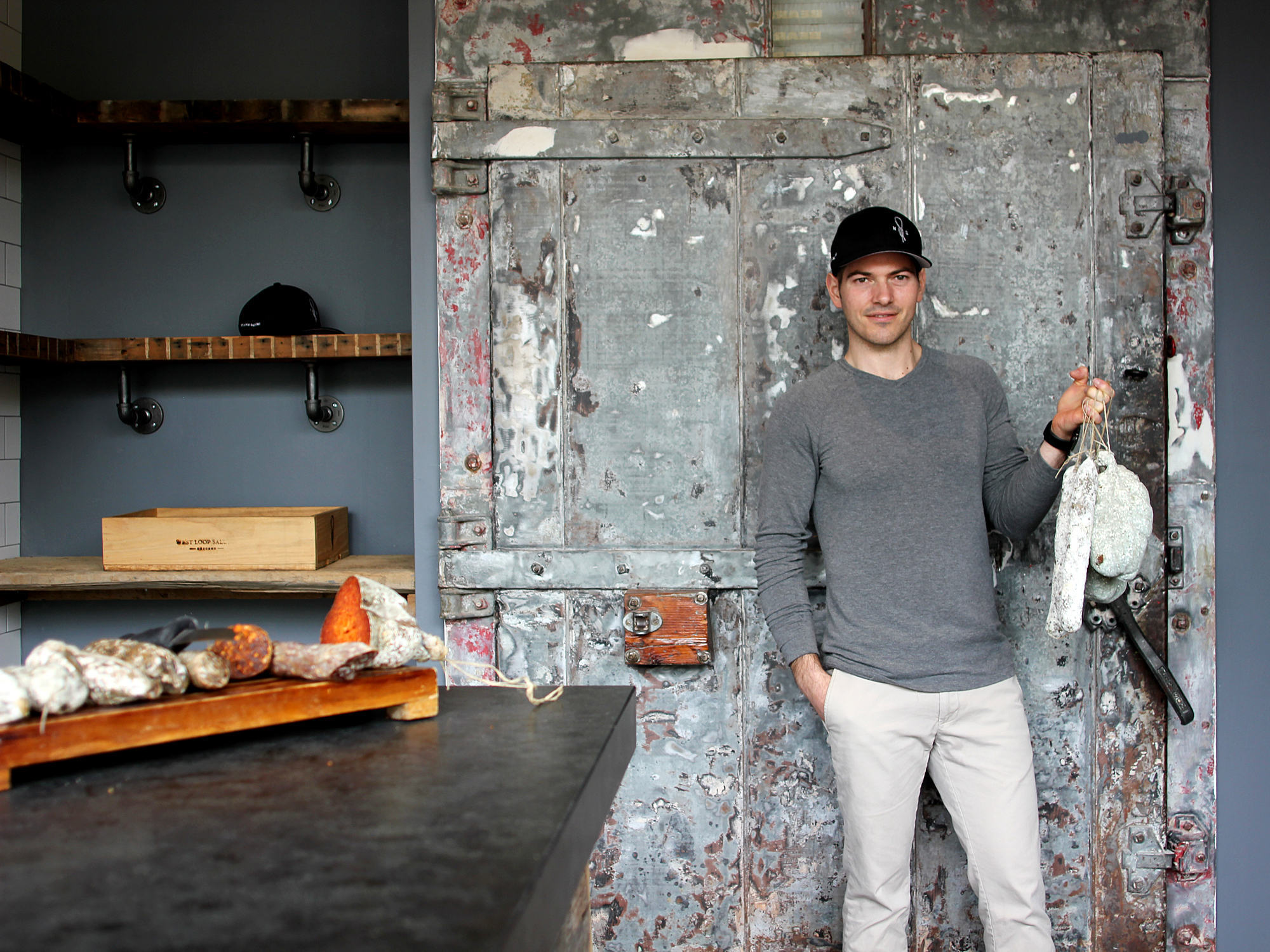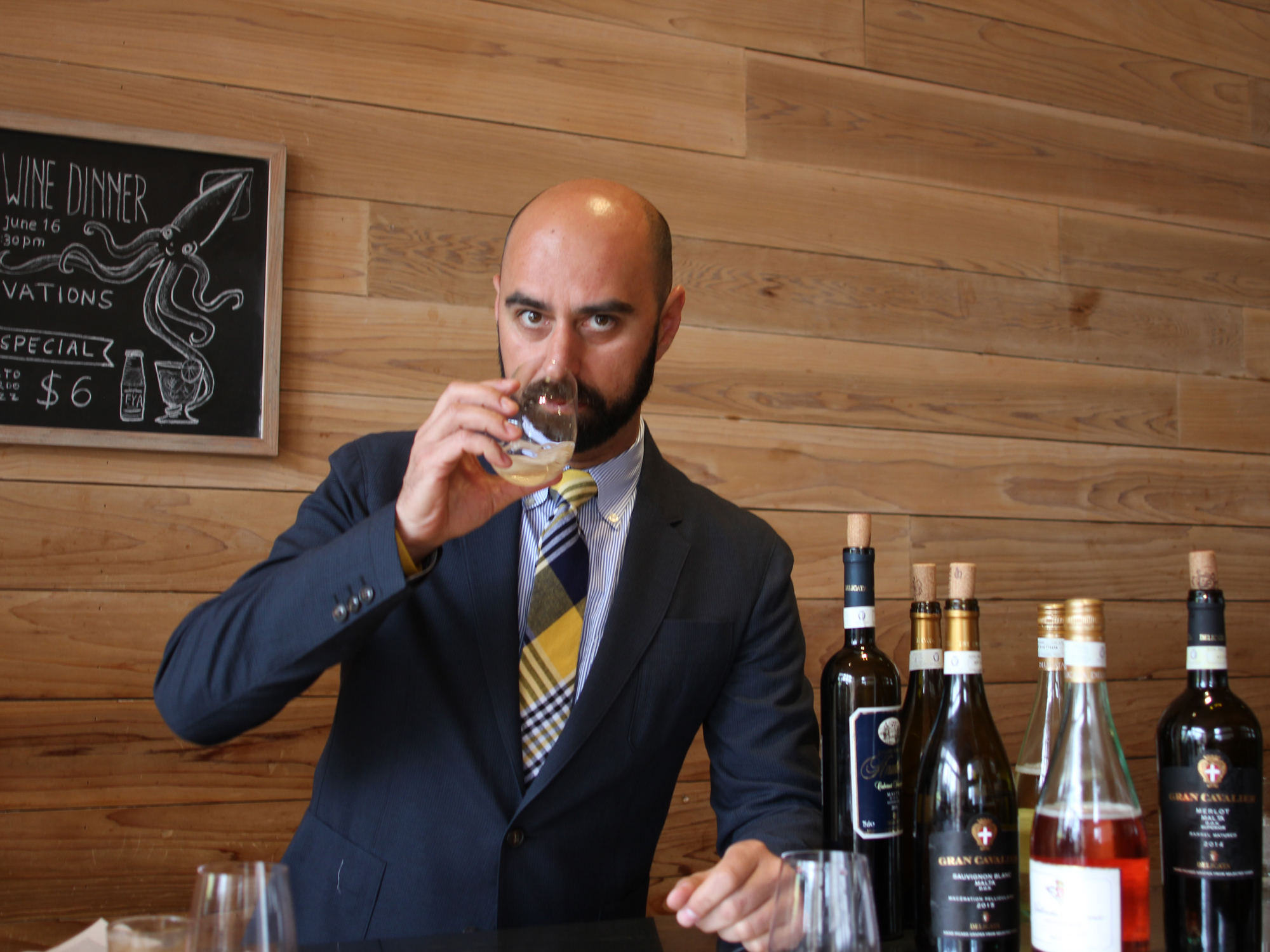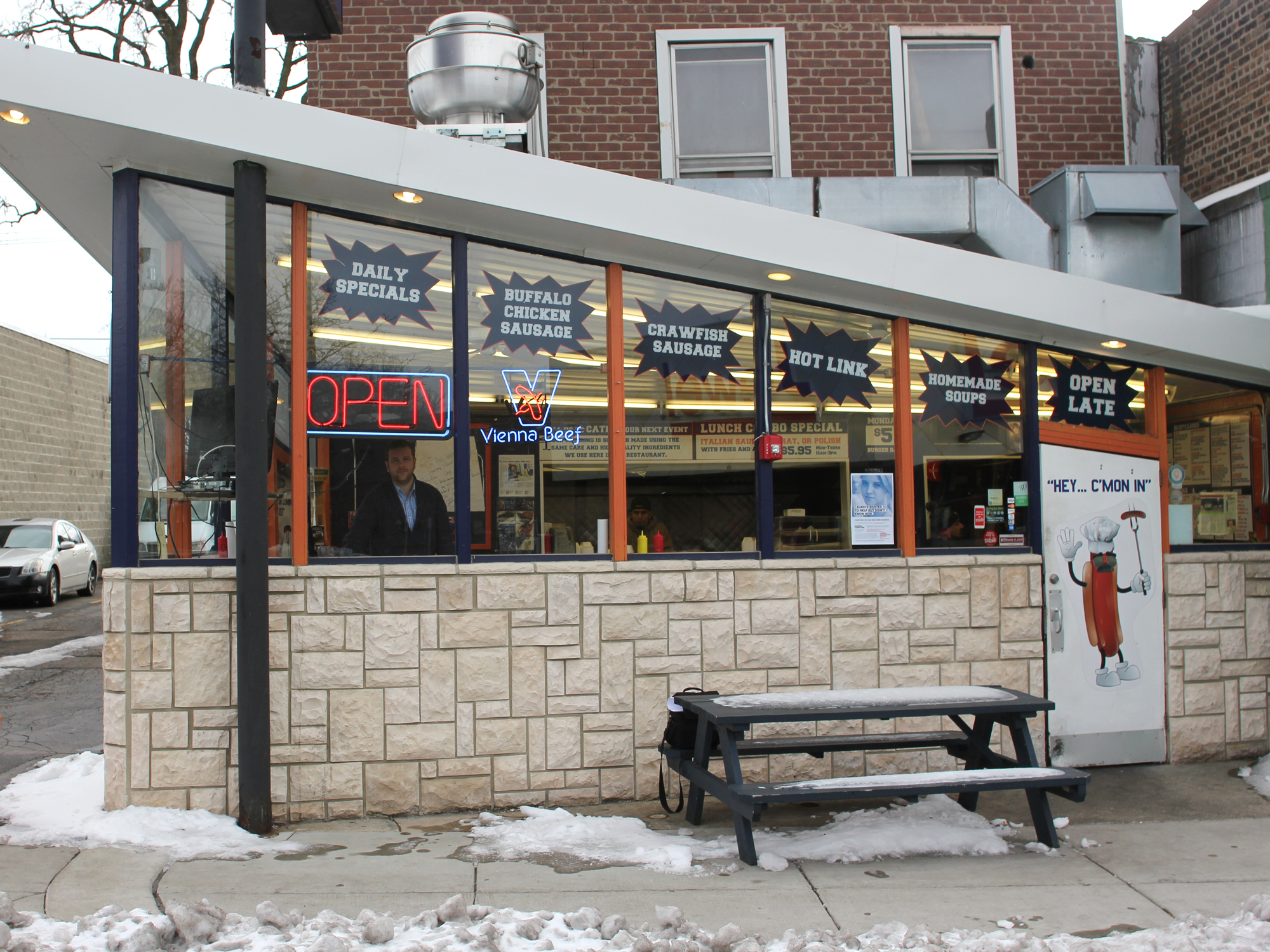NOT THAT LONG AGO SHERMAN KAPLAN was as ubiquitous in the foyers of restaurants as Steve Dolinsky or the Grub Hub sticker—if he’d reviewed it on the radio, his review, typed up on WBBM stationery, was likely to be posted in the entryway, and the latest paperback of his reviews was one of the primary guidebooks to the dining scene in the days before the internet made everyone a critic. His almost 50 years as a news anchor at WBBM included a solid 35 years on the restaurant beat before he retired as a professional eater in 2010, including a James Beard Award nomination in 1994 for Best Restaurant Reviewer—Radio.
Josh Kaplan, his son, started at a hot dog stand (the North Shore’s venerable Michael’s) and worked his way up as a manager and sommelier through restaurants ranging from MK and Lola in Cleveland to Eleven City Diner. Last fall he and chef Mark Newman, who grew up down the street from him in Highland Park before working at places like Cibo Matto and Piccolo Sogno Due, opened Ballaro, which they describe as a “neighborhood city restaurant,” a contemporary Italian restaurant in the north shore suburb and restaurant hub of Highwood.
So what’s it like to be father and son on either sides of the great divide between critic and restaurateur? We sat down at Ballaro recently with both of them to talk about it. Read the transcript below, or listen to an extended version (including Sherman’s Julia Child imitation!) below or via the Fooditor Radio podcast.
Subscribe to Fooditor Radio at iTunes or Stitcher.
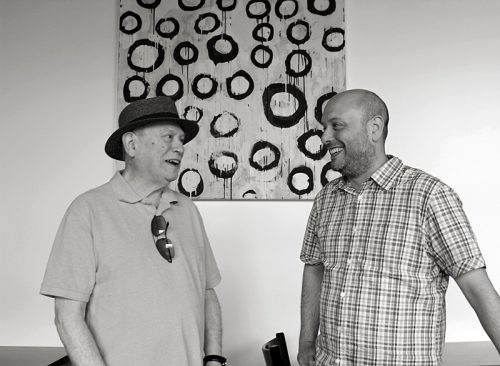
FOODITOR: So how did a newsman become a restaurant reviewer?
SHERMAN: I came to Chicago in February 1969, and I was working here for about a year and a half or so. And I noticed that all the newspapers had restaurant reviews. And to be honest, I’d never heard of restaurant reviews before then. I mean, the biggest name I’d heard in food was Duncan Hines, and having your name on a cake mix was the greatest thing you could have.
But I saw that there were restaurant reviewers working for the Sun-Times and the Tribune, and I said, we’re kind of like the all-news station, I think we should have a restaurant reviewer. I was interested in food, not actually trained in it but interested as a general diner. I went to our news director at the time, Van Gordon Sauter, and I proposed the idea. He kind of mulled it for a while, a few weeks, and then he said all right, there’s a new restaurant that’s opening in the John Hancock Center you can go and review.
And that was The 95th, and that was my very first review. It caught on after that, so I kept doing it, week after week after week.
This was the 70s, 80s, 90s, a very different landscape for reviewing from today.
I was a very small part of it—mine was radio. For something to have any validity, you had to see it in print. The big reviewers were the Kelsons for Chicago magazine, I think Pat Bruno was reviewing for the Sun-Times then, and I think Vettel, Phil Vettel, was reviewing for the Tribune. Those were the big three, and I was just playing catch-up. I mean, any time I got any response from a listener, I was delighted. Didn’t get a lot of it—people only call you or contact you if they’ve got something to complain about. They couldn’t blast you on Yelp or Facebook or any other place.
There weren’t 2000 comments on every review?
‘Fraid not. I would have loved that—it doesn’t matter what they say about you as long as they spell your name right!
But things picked up and by 1977, my first restaurant book was published. It was called Best Restaurants Chicago, it was a publishing company out of San Francisco, and I knew about them because they had done books in other cities.
None of the restaurant guides ever sold more than 10,000 or 14,000 copies, at our best. Which I guess for a local market book, is not too bad. It was fun to see myself listed in the Library of Congress, with an ISBN! That was cool.
Well, to me, as soon as I moved here I was gathering guidebooks, and going to restaurants where I would see your reviews on the wall. So it was definitely part of the scene.
I didn’t go without recognition. But a restaurant reviewer should be in the background. We have to be anonymous to be valid. I always was, and I did my best to protect my anonymity. I used a fake name to make my reservations, or had somebody else to make them.
But that voice! You can’t hide that. They didn’t recognize that voice from the news on WBBM?
Well, a lot of people did, but it’s surprising how many didn’t. I never considered myself a big star. Just a second echelon luminary, that was fine for me.
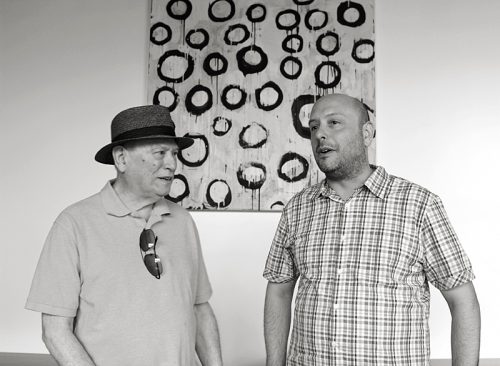
So Josh, you grew up in this world, did you go to all these restaurants?
JOSH: I went to a handful of them, but I was pretty misbehaved, so I didn’t get to go to the fancy ones.
No memories of Le Perroquet for you?
No, well, looking back on it, I wish! I wish I had those memories, but you didn’t take me—
SHERMAN: Those weren’t children’s restaurants. We did take you places like Sally’s Stage—
JOSH: Zephyr—
SHERMAN: Things like that, which were clearly geared for families. You got out from time to time, but it wasn’t a deliberate oversight, I just didn’t think these restaurants that I reviewed were necessarily children’s restaurants, or that he would like anything at them.
JOSH: I gravitated more to the working in restaurants end, I worked in a restaurant in high school, Michael’s, right down the street.
You weren’t interested in food as food at that point?
I mean, I loved eating, I certainly had a healthy appetite, but I wasn’t fascinated by food until I was in my early 20s. But as a kid, it was just a normal interest—it was just eating, sustenance.
SHERMAN: But you used to joke to me that at KU, when you were a member of a fraternity—
JOSH: But by then I was 20—
SHERMAN: Right. But I remember you told me, that’s where I learned to eat prison food.
Any time I got any response from a listener, I was delighted. People only call you or contact you if they’ve got something to complain about.
Did your dad ever walk into Michael’s and you immediately froze up, because you were about to get reviewed?
JOSH: No, Michael’s, I had fun, I loved it, I genuinely enjoyed it. I was working the counter, but I made it fun.
SHERMAN: One of the things that Josh picked up, certainly, at Michael’s and we were aware of, was the very strong work ethic that he had then, and has developed until today. Wherever he was working, if I had an occasion to call him on the phone, his immediate reaction was, I can’t talk now, I’m working, call back later, or I’ll call you back. He devoted every one of his paid minutes to his employer.
JOSH: That actually happened as recently as yesterday (laughs).
Well, tell us about your restaurant here. We are in Highwood—
Highwood’s got a nice little restaurant scene, and we thought we could differentiate from what’s here. We’re contemporary Italian, which basically allows us to do really whatever we want with Italian ingredients. As opposed to doing something like down the street, which is Del Rio, which is more spaghetti, meatballs, lasagna, veal marsala, etc. It’s great, it’s lovely, but we can do something different in the menu as well as in the atmosphere and the look of the place.
In my mind, this is a neighborhood city restaurant. This restaurant could be in Andersonville or Bucktown—that was my inspiration, to have a city-like vibe for the people who may not want to go downtown for that experience.
SHERMAN: And you’ve gotten some of those comments on Yelp and Open Table reviews, pointing out that you are like an urban restaurant in the suburbs.
One thing I’m going to point out, and Josh, he wouldn’t say this, but—everything that is here is his and Mark Newman’s idea. I contributed nothing, except the artist whose paintings hang on the wall, a man by the name of Ezra Siegel. But in terms of the concept, the look of the place, everything was Mark and Josh’s. My wife and I would make suggestions—
JOSH: Oh, you weighed in frequently! Which is a natural instinct—
SHERMAN: And I’d get a general “Oh, that’s nice,” and a roll of the eyes, and Josh would go thank you, and do what he intended to do anyway.
What does he know about restaurants, anyway?
SHERMAN: Which is exactly the point, I don’t. I thought I did—
JOSH: You know from this end. The diner’s end.
SHERMAN: I came to realize that creating a restaurant, or any business that has a particular theme, where you’ve got to fill in the four walls, and make something of it—it’s like being a film director. Your job is to communicate that vision to everyone you work with, so they understand exactly what you’re looking for—
JOSH: It’s the world’s largest train set.
Nice Orson Welles reference. So people have gone for your vision?
Absolutely. I’m thrilled with how it’s gone.
We were talking about how the reviewing landscape has changed—how do you feel about it? You’re too far to get the city media to pay attention to you, North Shore magazine is gone—
I had a conversation with my wife about it—what are the drivers, what is bringing people into the restaurant? Number one is word of mouth. That trumps everything up here, I can’t speak to downtown. Word of mouth is number one, number two, then there’s Chicago magazine, we got media placements there and that’s helped a lot.
Number three is Yelp. I know a lot of people in my industry don’t love it, I have no beef with Yelp. It’s helped, and it’s important and it’s part of the dialogue, and it’s driven people to this restaurant. So I’ll take it.
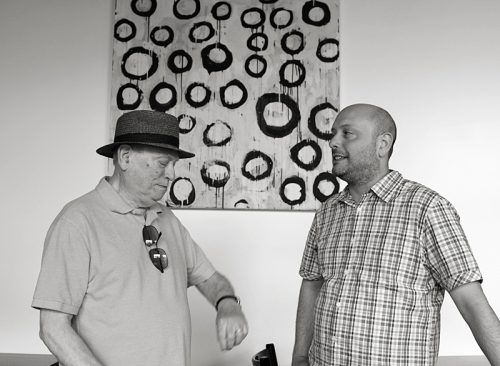
So Sherman, how did you feel about how the restaurant scene evolved over time? You worked through a period that created the modern scene—
SHERMAN: There were some clear evolutions, though evolution’s slow, it doesn’t happen like that. It wasn’t a revolution, it was an evolution. There were some revolutionary things that happened, among them, the birth of the French nouvelle cuisine. Which changed the landscape of most of the French restaurants here, they got away from the thick cream sauces and the tableside service, using lighter fare. Using locavore products, without that concept being in anybody’s mind as a word.
Le Perroquet paved the way there with Jovan Trboyevic, when he had that restaurant, and before that he had his own restaurant called Jovan on Huron street, Le Perroquet was on Walton street. It had kind of a gated, wireframe elevator—very European. It was on the second floor, and you walked in, and were greeted at the desk. The place was hushed—that’s another thing. Big change!
Back then you could go into a restaurant and people spoke in ordinary, conversational tones. We noticed this—we just got back from Paris. And you go into a French restaurant and there’s no yelling, there’s no screaming, there’s no problem with noise. That’s the worst change in restaurants—
JOSH: Sometimes the physical space dictates that, that’s the case in this restaurant—
SHERMAN: Oh, I understand that, but I think it’s just part of the cultural milieu.
JOSH: Some places turn the music up loud, to create the energy.
Or like Blackbird, where they put the tables close together to make it buzz with activity—
SHERMAN: It creates an excitement. That’s an artificial excitement, though. Let the food be the excitement. That’s just my old-fashioned point of view.
But getting back to the other transitions, so you had the nouvelle cuisine, and then we had this tremendous interest in ethnic restaurants. Which had been here all the time, because Chicago is such a wonderfully diverse ethnic city. So that became very popular, and searching out new restaurants in the city. And then you had the growth of the restaurants in the suburbs, probably spearheaded by Le Français and Jean Banchet. And then subsequent French restaurants that opened, like Alouette in Highwood, Le Vichyssois out in Lake Villa I believe, and Pierre Pollan’s restaurant on Dundee Road, the name escapes me—
JOSH: Le Titi de Paris.
To me one of the big changes, and this is maybe in the last 10 years or so, is that the high end became less formal.
SHERMAN: Very much so. We used to go to The Bakery a lot, The Bakery was a hugely popular restaurant [in Lincoln Park] at a very moderate price, but it introduced people to a more set way of dining, five courses, all one price. Louis Szathmary was the genius behind that. It was a place that was very eclectic in its decor. But there was always white tablecloths, cane-backed chairs, waiters wearing white tuxedos, and I remember the first time we had walked in there and they had dropped their dress code.
My partner does all the work, he’s cooking. I just walk around and talk to people and open bottles of wine.
And I was rather shocked at that. Because I just thought, this kind of restaurant held a standard, even though it was not one of your ultra-gourmet restaurants, it was a very popular restaurant, but I still thought that they should have a dress code. It didn’t, and as Louis’ brother Geza said to me, you just have to go with what people want. And he’s right!
JOSH: That’s our job—give people what they want.
SHERMAN: My wife constantly tells me, you can’t go dressed like that. And I say, why not? I do. Sometimes I put on a different shirt and a different pair of jeans, and Josh is dressed like that. Which is perfectly acceptable. This is the way people dress, very casually. If I was going to, well, a restaurant like Les Nomades, I would dress differently—might even wear a necktie. I don’t even know if they demand neckties, I’m sure they demand jackets. Everest is a restaurant that no doubt still demands jackets. There are a few of them, not many. More in New York—but there’s more of everything in New York, the good and the bad.
One of my pet peeves about restaurants is those restaurants that will not take reservations. And that says to me, they’re in business for their convenience—
JOSH: Well, I’m going to beg to differ with that. A small restaurant has to maxmize those seats. If you’ve got 40 seats in your restaurant, they’ve got to be occupied at all times. You’ve got to factor in the no-shows—there’s a percentage of people, they don’t cancel, they don’t show up. And so, again, in a small restaurant, you’ve gotta have those seats full.
SHERMAN: It just sends a message to me that I’m not always crazy about. Because I may want to go to a restaurant but I don’t want to go if I know I’m going to be standing in line, waiting, anything more than 20 or 30 minutes.
Well, and apparently it’s three hours now for an Au Cheval burger.
JOSH: I was just going to say, imagine if they took reservations, they’d lose millions of dollars. But you make it part of your night out. You put your name in, then you walk around, go have cocktails, and come back.
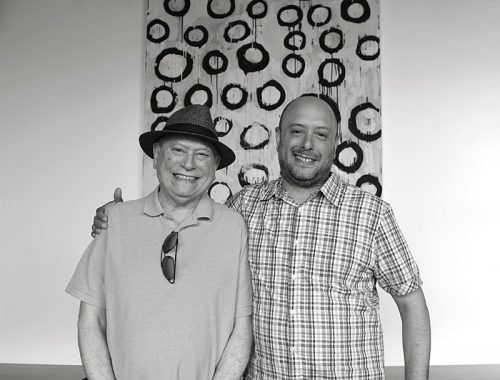
So I have a final question for each of you. Sherman, if there’s any restaurant you could go back to that’s not around any more, what would it be?
SHERMAN: Gianotti’s. The Italian restaurant [in Schiller Park], my all time favorite Italian restaurant owned by a man named Vic Gianotti, whose father Nick supposedly invented Chicken Vesuvio, but you and I have talked about this off-mike and you convinced me that no, he didn’t invent Chicken Vesuvio, it was a dish that had been around since the 1920s, perhaps.
Chicken Vesuvio has many fathers.
I suppose it does. But that would be my favorite. Vic Gianotti was a genius, his father also, the way they did—it was a Neapolitan-Sicilian place, a lot more Neapolitan than Sicilian, but a good, basic, red sauce restaurant. Even better than good, it was great. So that’s a restaurant that I miss.
Le Français—not that I went there often, but when I went, it was always an experience, very special. Those two stand out, among restaurants that I wish were back. Arnie’s, in the city, was always a good place, the Arnie’s north was great for a terrific Sunday buffet.
That’s Arnie Morton—
Who certainly left an indelible impact on the restaurant scene, through his daughter Amy, who has Found, and his son David who’s working with Michael Kornick in establishing a chain, and his other son, Peter Morton, who created the Hard Rock Cafe.
They’ve done okay for themselves. So Josh, your question. It’s Friday night. Your dad comes in. What happens?
JOSH: (Laughs) You make it happen! Well, you’re courteous enough to give me the heads up. You always make reservations.
SHERMAN: We get no special treatment.
JOSH: (Laughs more)
SHERMAN: I say that positively. Josh would give special treatment to nobody. I mean, he has people who come in again and again, obviously they’re recognized, and once they’re seated they’re catered to, but so is every guest—
JOSH: Let’s just rephrase “he doesn’t give special treatment to anyone.” Let’s just tweak that a little bit.
We acknowledge and we do recognize our regulars, and our family and our friends, and we always make note of it to the server, to the kitchen, and we always know when friends and family or whomever is in the building. And yes, that doesn’t mean something different happens, it’s just a heightened level of awareness. And maybe something will happen…
SHERMAN: I do enjoy watching Josh work the dining room, because he knows how to do it so well. He keeps an eye on his staff, and he always knows that everything is going well, but he always has time to stop and talk to people.
JOSH: I don’t work! I always say my partner does all the work. Mark does all the work, he’s cooking. I just walk around and talk to people and open bottles of wine. It’s easy.
SHERMAN: Arnie Morton used to say, “I’m just a saloon keeper.” He was a hell of a lot more than a saloon keeper, and Josh is a hell of a lot more than a saloon keeper.
JOSH: Whether it’s my dad or it’s someone who’s been here twenty times since we opened, which actually has happened—we’ve got a ton of regulars—you make it happen. And every restaurant has that, when XYZ regular walks in the door without a reservation, what do you do?
What do you do?
You juggle. The reservation system, the door, is like a jigsaw puzzle, crossed with a domino set, crossed with a Ponzi scheme. And you make it happen. I will leave it at that. Industry trade secrets will remain unspoken.
Michael Gebert is the proud father of two sons and Fooditor.
Latest
Join the Discussion
After you comment, click Post. If you're not already logged in you will be asked to log in or register with Disqus.



